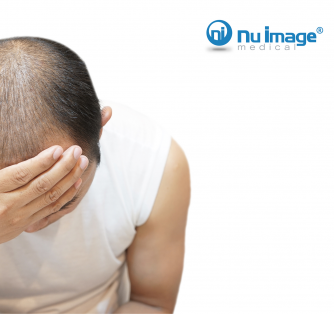Menu
Weight loss
Hormones
Sex
EXPLORE
MEET NU IMAGE MEDICAL
TREATMENTS
MEET NU IMAGE MEDICAL
TREATMENTS
MEET NU IMAGE MEDICAL
Working Through Generations of Hair Problems


Though baldness is often considered one of the earliest, visible signs of aging, at the rate that millennials are losing their hair, aging symptoms need to be reconsidered. Even though the millennial generation spans a young demographic of 22-39 year-olds, the most common sign of aging (apart from wrinkles) seems to be moving away from the Baby Boomers and hitting the young people. Statistics say that 60% of millennials are fighting tooth and nail to combat the physical signs of aging, with a study in China revealing that males in their 20s are reporting going bald sooner than any of the generations before them.
A Cross-Generational Crisis
Thinning, balding, and receding hairlines are problems that occur at any age, but the effect that these conditions have will vary across generations. Society generally accepts balding as a condition of aging, and though it isn’t pleasant, there is a subconscious expectation that it will occur. Baby boomers and the Gen XersGenetics has a lot to do with loss that occurs prior to entering one’s 40s, but with many of the new studies, it seems that increased stress levels and environmental factors are contributing the rise in loss with millennial patients. Though treatment options for hair loss are similar between the age groups, it is harder for young people to conquer a lifetime of hair crises than react to natural bodily changes over a decade or two. Loss isn’t explicitly linked to males either, as women (who traditionally experience loss as a part of the aging process) are now experiencing significant shedding as early as their 20s. With several research studies offering several different explanations for the increase in loss, millennials are more at risk for having a lifelong struggle with hair growth and retention.
Impacting Factors and Differences
For the most part, research indicates lifestyle factors as the primary reasons millennials are losing their hair at faster rates. Stress is a key cause of hair loss, and the career, school, family, and financial demands on a millennial are worrisome. According to survey data, there is also less emotional stability with millennials, as one in five workers report feeling depressed or anxious about their jobs and careers compared to around 16% of all Baby Boomers and Gen Xers. Reports also show that 40% of millennials declare their emotional health and stress management getting worse, interrupting sleep patterns, influencing poor dietary choices, and triggering unhealthy coping mechanisms (drug use, smoking, or increased alcohol consumption). Millennials struggle with appearance-based acceptance, possibly encouraging hairstyles, colors, or hygiene habits that are detrimental to hair health. Fad diets or intense workout routines can also cause damage to hair follicles, interrupting normal hair growth.
On the other side of the spectrum, Baby Boomers and those who have moved past their prime are more comfortable in their lifestyles and routine. They tend to display less stress and anxiety over finances or career moves, having already been established in their job for quite some time. The older people get, the more they tend to worry about their health. These concerns tend to lead toward better dietary choices, increased exercise, and abstaining from recreational drugs or drinking. These patterns or activities are conducted in moderation, with a healthy balance that addresses total body well-being. The natural progression of aging and the effect on hair follicles can still lead to balding or thinning, but the emotional and social effects of the process don’t appear as damaging as experiencing loss as a millennial.
The Social Struggle
It is a lot harder for some people to overcome the stigma or feelings of shame and embarrassment with losing hair than others. Though people understand how medical conditions and treatments like chemo can lead to baldness, seeing a man in his early twenties with a sizable bald spot causes whispers and second glances. There are some celebrities who celebrate being bald, such as Jason Statham or the Dwayne Johnson, but for the most part, social culture dictates doing something about your hair loss as soon as possible. There is a psychological effect that takes place when you lose your hair, contributing to feelings of depression, isolation, and fear. There is a fear of joining in with social gatherings, feelings of loneliness since you are afraid of ridicule at the local club, and depression over relationship complications. Living an entire lifetime without hair is a devastating thought for millennials.
Losing hair is more than just a physical problem. It affects a person’s psyche, which in turn impacts their social and emotional wellness. The good news is that there are effective treatment options that can help you stop the shedding while encouraging new growth. Whether you are 22 or 62, you don’t have to be a victim of baldness and hair loss.
Nu Image Medical® offers a new and futuristic approach to achieving optimal health and wellness. The company has been a weight loss, anti-aging and wellness provider since 2004 and offers medically supervised programs for medical weight loss, peptides, erectile dysfunction, scream cream, and hair loss (NuDew)
This article is for informational purposes only and does not constitute medical advice. The information contained herein is not a substitute for and should never be relied upon for professional medical advice. Always talk to your physician about the risks and benefits of any treatment. Nu Image Medical may not offer the medications or services mentioned in this article.
